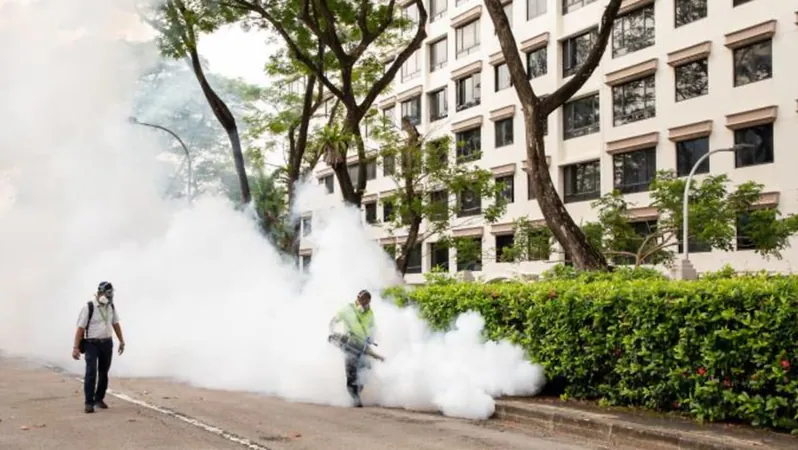
Can Singapore Achieve Zero Dengue Deaths? A Comprehensive Look at the Challenges Ahead
2024-09-27
Can Singapore Achieve Zero Dengue Deaths? A Comprehensive Look at the Challenges Ahead
SINGAPORE: The question of whether Singapore can achieve a future with absolutely zero dengue fatalities is more pressing than ever. The nation, which has battled dengue since its first recorded outbreak in 1960, faces significant challenges, with over 11,000 dengue cases reported in the first 37 weeks of 2024 alone—outpacing the total of 9,949 cases documented throughout all of 2023. Alarmingly, 13 dengue-related deaths occurred between January and June 2024, more than doubling the six fatalities recorded in the previous year.
The World Health Organization (WHO) has aimed for a target of zero dengue deaths by 2030 as part of its sustainable development goals. With Singapore’s rich history in tackling mosquito-borne diseases, if there is anywhere in the world capable of achieving this, it’s here. However, this requires a multifaceted approach that engages various sectors of society.
Underlying Issues: Underreporting and Vulnerabilities
Reports suggest that the actual dengue infection numbers are merely the tip of the iceberg. Many infections are asymptomatic or result in such mild symptoms that individuals are unaware they are infected. This poses a crucial challenge: without awareness and proactive measures, the cycle of transmission continues undetected.
Moreover, Singapore recently experienced catastrophic outbreaks, with cases soaring to 35,210 in 2020, leading to 32 deaths. Despite what was considered a "good year" in 2023, the six fatalities from 9,949 cases indicate that the threat remains significant. The concept of herd immunity has also shifted over the years. Today, many residents face their first exposure to dengue later in life, leaving them vulnerable when outbreaks do occur.
Innovative Strategies in Mosquito Control
Among Singapore's notably successful initiatives is Project Wolbachia, started in 2016. This program involves the release of lab-grown, non-biting male Aedes aegypti mosquitoes infected with the Wolbachia bacteria, designed to reduce mosquito populations by preventing the etching of viable offspring. Reports show that areas involved in the program have seen a remarkable 77% reduction in dengue infections.
Community engagement through public education and awareness campaigns continues to play a vital role. Measures include color-coded dengue alert banners and ongoing educational outreach aimed at curtailing mosquito breeding.
Advancements in Vaccine Development
A key factor in Singapore's ongoing battle against dengue is the development of vaccines. Currently, the country has only one licensed vaccine, Dengvaxia, limited in its use due to restrictions on age and previous infection. The situation is further complicated by Sanofi's recent decision to cease production of Dengvaxia due to declining global demand.
Another promising contender, Qdenga, has been introduced in several countries, including Indonesia and Thailand, and has shown effectiveness in reducing hospitalizations. However, the WHO does not currently endorse its use in Singapore due to the country's low transmission rates. Furthermore, concerns about Qdenga's efficacy against all dengue serotypes persist, especially given that Singapore has a history of outbreaks linked to serotype 3.
Meanwhile, ongoing clinical trials for the TV003 vaccine in Brazil hint at potential breakthroughs, though long-term data is still awaited.
The Path Forward: Innovation and Community Engagement
As Singapore strives for zero dengue deaths, innovative solutions are crucial. Developing non-invasive diagnostic tools, which could utilize saliva or urine instead of blood, may allow for quicker, more effective detection of dengue cases. Implementing user-friendly testing kits at the point of care could enable infected individuals to take immediate precautions, disrupting transmission.
Current treatment protocols emphasize supportive care, with an educational component aimed at recognizing severe dengue symptoms. The government is actively revising its national clinical management guidelines to enhance care.
Despite the solid groundwork laid in Singapore's fight against dengue, complete eradication of dengue fatalities will demand a collective, multipronged, and sustained approach from all stakeholders. The road ahead may be long, but with innovative thinking and a commitment to collaboration, the dream of zero dengue deaths remains within reach.
Stay tuned as Singapore continues its relentless pursuit of this goal!



 Brasil (PT)
Brasil (PT)
 Canada (EN)
Canada (EN)
 Chile (ES)
Chile (ES)
 España (ES)
España (ES)
 France (FR)
France (FR)
 Hong Kong (EN)
Hong Kong (EN)
 Italia (IT)
Italia (IT)
 日本 (JA)
日本 (JA)
 Magyarország (HU)
Magyarország (HU)
 Norge (NO)
Norge (NO)
 Polska (PL)
Polska (PL)
 Schweiz (DE)
Schweiz (DE)
 Singapore (EN)
Singapore (EN)
 Sverige (SV)
Sverige (SV)
 Suomi (FI)
Suomi (FI)
 Türkiye (TR)
Türkiye (TR)